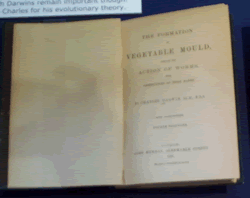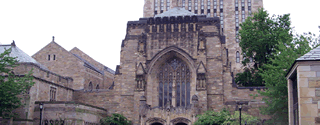| Sterling Memorial |
| Archives |
| Music |
| Divinity |
| Forestry |
| Kline Sciences |
| Medical Historical |
| Exhibit Map |
![]()
Charles Darwin, Formation of Vegetable Mould through the Action of Worms, 1881 In 1859, Charles Darwin (1809-1882) published one of the world's most influential books, On the Origin of Species. His claim that the evolution of new species occurred by the process he called natural selection emerged from the grander view of nature as an economical circulation of matter (that he learned in part from his grandfather Erasmus). In his Worms, Charles discussed the important role worms play in cycling matter through nature and to the benefit of plants: “The entire superficial bed of vegetable mould passes through heir bodies every few years.” Worms prepare the ground in an excellent manner for the growth of plants of all kinds.” They mingle the mould together like a gardener who prepares fine soil for his choicest plants.” (pp. 305-313) |
||
 |
||
Whitney Humanities Center
Yale University
53 Wall Street
P.O. Box 208298
New Haven, CT 06520-8298
Office: (203).432.3112
lloydackert@sbcglobal.net
The
Sterling Memorial Exhibit is located in the Overflow Case
to the left of the circulation desk. The Sterling Memorial
Library is located at
120 High Street
Yale University
New Haven, CT 06520
Map, Directions
